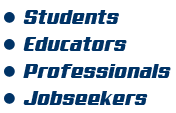|
||
To be a team member requires more than just being able to do your own job. Often, your effort is dependent upon colleagues doing their job effectively and on time; equally, their success is dependent upon you doing your job effectively and on time. If your output cannot be relied upon or is delayed, then they are effort is compromised and the team cannot achieve what it is required to achieve. There are some important team skills that you need to appreciate and develop. Some of these only apply in certain contexts. Take a look at the video to see what these things are all about. Then think about your own work situation, how you fit in, what your strengths and weaknesses are. Team skills -- Video There are some important team skills that you need to appreciate and develop. Some of these only apply in certain contexts. We’ve listed Team tasks Sentry duty: At least one person in the team needs to be on guard in order to recognise changes to the outside world which flag events that the team then has to deal with. Triage This is usually related to monitoring the environment. When an event does occur, the sentry must act to alert the appropriate member of the team to respond. Collaboration: You need to appreciate what your colleagues are having to do and make sure you provide them with the things they need when they need it, if these requirements fall within your job. Cooperation: You need to respond to requests from colleagues to provide additional information or material if it will help them complete their tasks effectively. Context sensitivity: You need to be aware, if possible, of what colleagues are currently trying to do so that you can provide support or withhold disturbance so that your colleagues are able to work most effectively. This involves not interrupting them when they are pressured, but it may involve interrupting them when they are pressured if you have information that is pertinent to relieving the pressure. Support: You must remember that your colleague success will influence team success which perfect your own success. A good team skill is supporting people, by stepping in and taking over aspects that they cannot cope with temporarily, in order to give them time to catch up. You would also hope to receive the same support. Delegation & collaboration: You must learn to delegate and collaborate. This will enable you to cope with demands placed yourself when pressures are great and it will also give your colleagues opportunities to develop new skills which they can then claim in their future cases were advancement. And you will receive the same benefits from them. This is a measure of good team skill and putting the interests of the team above your own personal interests. Too often in teams one sees colleagues withholding information an opportunity from each other in order to preserve their own stake in what is going on. This is certainly not in the interests of the team or the organisation and it may not be in your own interest because you will suffer from this lack of cooperation and may even be judged to be a poor team member. Sharing skills An invaluable function in the team is to help colleagues, by stepping in when they are overstretched. Often such help can ensure the pressures on the team are reduced and that the team can function most effectively in meeting its aims. This includes being able to pick up what other people do and, in turn help other people to understand what you do. Apart from removing bottlenecks in team activities, such collaboration can serve both parties, because it provides experience of a wide range of activity which can be beneficial in future promotion opportunities. Feedback: Crucial in any team activity and communication is providing effective feedback. Colleagues need to be told that their messages have been understood and are being acted upon. They should be given prompt feedback that an email message, for example has been received (with gratitude). Otherwise they could be distracted by wondering whether work they have done as been of use to you. Letting people know how things are getting on is a courtesy as well as a basis for an effective team. Supervision Ensuring everything is getting done Developing team members Troubleshooting Managing workload Team leadership Goal setting Motivating A problem with teams The successful team doesn’t always enable effective performance to be recognised and rewarded. A good team member may simply be somebody who undertakes the tasks seamlessly and makes everybody else look good by making their work easier. So there is the risk that other people get rewarded for what you have done. And many people realise that recognition of performance only comes with scoring the goal at the end of a good move. They may even find it to their benefit to undermine other team members are not providing them with the service they have been provided with themselves. Failure to recognise a person’s team effectiveness is a failure of management and leadership. That still leaves individual who has been conscientious but not obvious without opportunities to demonstrate their worth.
|
||


